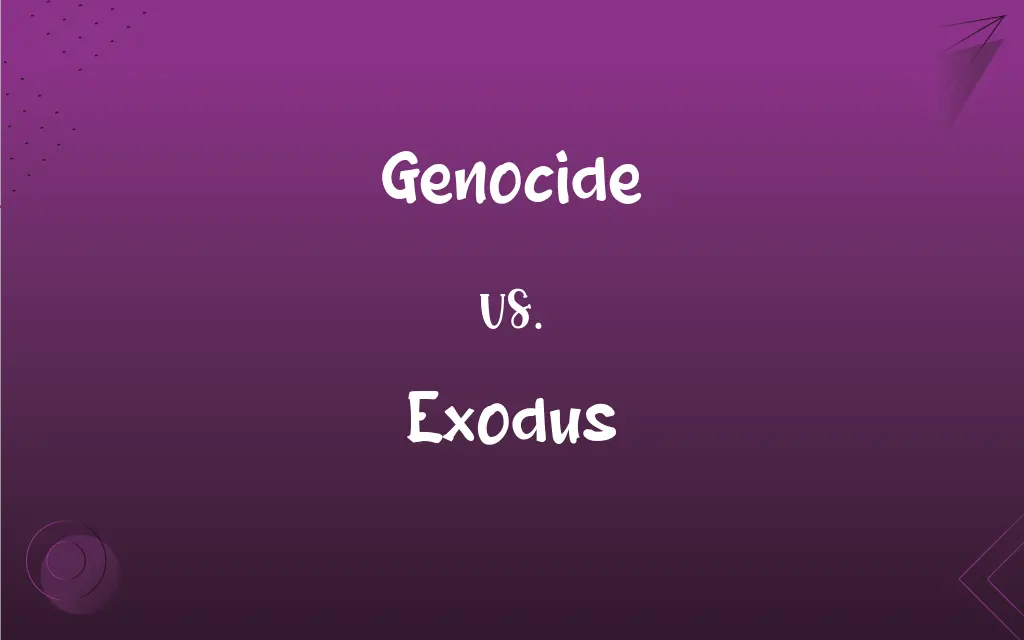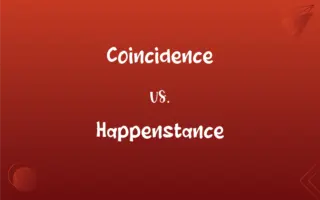Genocide vs. Exodus: What's the Difference?
Edited by Aimie Carlson || By Janet White || Updated on September 21, 2023
Genocide is the intentional extermination of a national, ethnic, racial, or religious group, while Exodus refers to a mass departure of people.

Key Differences
Genocide and Exodus are words with profoundly different meanings. Genocide refers to the intentional, systematic extermination of a national, ethnic, racial, or religious group, an act characterized by mass murders and widespread destruction. Exodus, on the other hand, denotes a large-scale departure of people, often to escape adverse conditions, persecution, or danger. It typically implies a journey from one place to another, often involving a large group of individuals or communities.
Genocide implies a severe, extreme form of violence and cruelty, aimed at annihilating a particular group of people. It often involves a multitude of atrocious acts, including killings, torture, and other forms of brutality. In contrast, Exodus does not inherently involve violence but is more about migration or departure, usually of a significant number of people, often driven by a collective need or desire to escape unfavorable situations or environments.
The term genocide usually conveys intent, involving premeditated acts designed to eradicate a specific group based on their ethnicity, religion, or nationality. It represents the darkest aspects of human behavior, fueled by hate, prejudice, and intolerance. Conversely, Exodus represents movement and displacement, often illustrating the human desire for freedom, safety, and a better life. It can be voluntary or forced, but it primarily denotes a journey or relocation.
Genocide is a crime under international law, and its perpetration leads to severe consequences, including international interventions, trials, and sanctions. It is universally condemned as it goes against the principles of humanity, morality, and civilization. Exodus, however, is not a crime but a phenomenon, a mass movement that can be the consequence of various factors including natural disasters, economic hardships, or escaping from crimes like genocide.
In conclusion, while genocide symbolizes the height of human cruelty and the deliberate destruction of specific groups, Exodus illustrates mass movement, the journey of people seeking refuge, freedom, or a better existence, often away from persecution and hardships.
ADVERTISEMENT
Comparison Chart
Definition
Deliberate extermination of a specific group.
Mass departure of people.
Implies
Intent, violence, and destruction.
Movement, migration, departure.
Involves
Atrocious acts, such as killings and torture.
Large number of people relocating.
Legal Status
A crime under international law.
A phenomenon, not a crime.
Associated With
Annihilation, prejudice, and intolerance.
Escape, journey, displacement.
ADVERTISEMENT
Genocide and Exodus Definitions
Genocide
The act of exterminating a large group of people based on their ethnic, racial, or religious identity.
The international tribunal was set up to prosecute those responsible for genocide.
Exodus
A mass departure of people, typically emigrants.
The exodus from the war-torn region was fraught with peril.
Genocide
Deliberate and systematic extermination of a racial, ethnic, national, or religious group.
The Holocaust is a grim example of genocide.
Exodus
A going out; a departure or emigration, usually of a large number of people.
Economic difficulties triggered an exodus to neighboring countries.
Genocide
The intentional destruction of a people, usually defined as an ethnic, national, racial, or religious group.
Acts of genocide are condemned by the international community.
Exodus
A situation in which many people leave a place at the same time.
The country experienced a mass exodus due to political instability.
Genocide
The infliction of conditions of life calculated to bring about physical destruction of a group.
The severity of the genocide led to international interventions and trials.
Exodus
A widespread departure from a location.
The sudden exodus left the town almost deserted.
Genocide
A coordinated plan aimed at the destruction of the essential foundations of the life of a group.
The genocide included acts of mass murder and cultural destruction.
Exodus
The journey of the Israelites from Egypt under Moses.
The Exodus is a central event in the Jewish faith.
Genocide
The systematic and widespread extermination or attempted extermination of a national, racial, religious, or ethnic group.
Exodus
A departure of a large number of people.
Genocide
The systematic killing of substantial numbers of people on the basis of their ethnicity, religion, or nationality.
A genocide will always be followed by the denial that it ever happened.
Exodus
In the Bible, the departure of the Israelites from Egypt.
Genocide
(by extension) The systematic killing of substantial numbers of people on other grounds.
Exodus
See Table at Bible.
Genocide
(by extension) The systematic suppression of ideas or practices on the basis of cultural or ethnic origin; culturicide.
Exodus
A sudden departure of a large number of people.
There was an exodus when the show ended.
A mass exodus
Genocide
The elimination of an entire class of monsters by the player.
Exodus
To depart from a place in a large group.
Genocide
(transitive) To commit genocide (against); to eliminate (a group of people) completely.
Exodus
A going out; particularly (the Exodus), the going out or journey of the Israelites from Egypt under the conduct of Moses; and hence, any large migration from a place.
Genocide
The systematic killing of a racial or cultural group; as, the Nazi genocide of Jews left few in Germany or Poland after World War II.
Exodus
The second of the Old Testament, which contains the narrative of the departure of the Israelites from Egypt.
Genocide
Systematic killing of a racial or cultural group
Exodus
A journey by a large group to escape from a hostile environment
Exodus
The second book of the Old Testament: tells of the departure of the Israelites out of slavery in Egypt led by Moses; God gave them the Ten Commandments and the rest of Mosaic law on Mount Sinai during the Exodus
FAQs
What does genocide specifically entail?
Genocide entails deliberate, systematic extermination of a specific group based on ethnicity, religion, nationality, or race.
Is Exodus always voluntary?
No, Exodus can be either voluntary or forced, depending on the circumstances leading to mass departure.
Is every act of mass killing genocide?
No, genocide requires intent to destroy, in whole or part, a specific group based on ethnicity, religion, nationality, or race.
Does genocide only involve killing?
No, genocide can also involve causing serious bodily or mental harm and creating conditions leading to physical destruction.
Can Exodus lead to the formation of new communities?
Yes, Exodus often results in the establishment of new communities or integration into existing ones.
Can Exodus be a result of genocide?
Yes, many people may embark on an Exodus to escape genocide or other forms of persecution.
Is Exodus always large-scale?
Typically, yes, Exodus refers to a mass departure of people.
Is genocide a modern crime?
While the term was coined in the 20th century, acts of genocide have occurred throughout history.
Can genocide occur without war?
Yes, genocide can occur in peace times and doesn’t necessarily involve war.
Is every Exodus related to persecution?
No, Exodus can occur for various reasons, including natural disasters, economic hardships, or seeking better opportunities.
Is genocide always based on ethnic or religious differences?
While often based on ethnic or religious differences, genocide can target any identifiable group.
Is there any legal repercussion for committing genocide?
Absolutely, genocide is a grave crime under international law, leading to trials, sanctions, and severe punishments.
Can acts of genocide be justified under any circumstances?
No, genocide is universally condemned and can never be justified.
Is Exodus a phenomenon only observed in humans?
Primarily, yes, Exodus refers to human migration, but metaphorically, it can describe similar movements in animal groups.
Can Exodus occur within the same country?
Yes, Exodus can refer to movement between regions within the same country.
About Author
Written by
Janet WhiteJanet White has been an esteemed writer and blogger for Difference Wiki. Holding a Master's degree in Science and Medical Journalism from the prestigious Boston University, she has consistently demonstrated her expertise and passion for her field. When she's not immersed in her work, Janet relishes her time exercising, delving into a good book, and cherishing moments with friends and family.
Edited by
Aimie CarlsonAimie Carlson, holding a master's degree in English literature, is a fervent English language enthusiast. She lends her writing talents to Difference Wiki, a prominent website that specializes in comparisons, offering readers insightful analyses that both captivate and inform.






































































